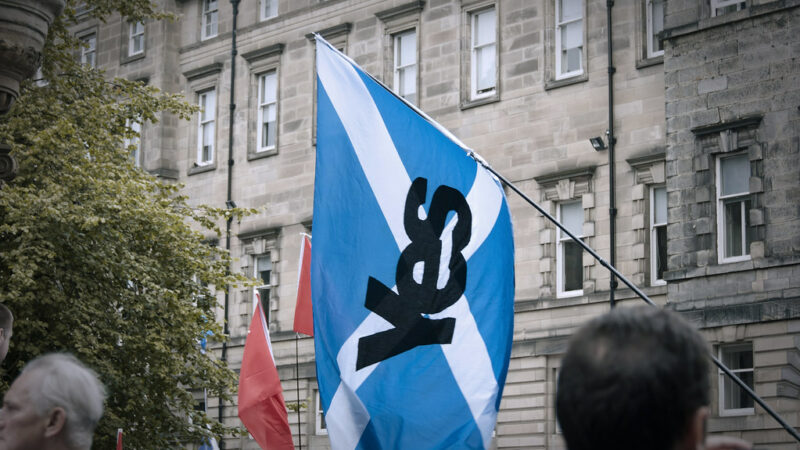The Covid-19 crisis may not make Scottish independence any more or less likely - but it will change the conversation.

Nobody could have predicted how the last few months in Scottish politics have gone.
At this point in the political calendar we were meant to be knee-deep in Scottish government demands for a second independence referendum and SNP infighting about the verdict of the Alex Salmond trial.
Instead, any prospect of a 2020 referendum has been firmly cast aside by the current crisis. The fallout of the Salmond trial may have been delayed rather than cancelled, but record polling for the SNP, and high approval ratings for Nicola Sturgeon, suggest that his chances of a successful political comeback have been blunted.
For obvious reasons the First Minster has said that electioneering and the constitution could not be further from her mind, but none of this has stopped people from speculating about the impact of the current situation on Scotland’s future.
Conservative leader Jackson Carlaw was quick off the mark in saying that it would look “ridiculous” for the SNP to prioritise independence in the near future. However, despite the backdrop, some SNP MPs have called on their party to step-up independence campaigning, with Angus MacNeil MP arguing that it would be “hopelessly naïve” to stop.
The state of debate
But where does public opinion stand? Writing in the Scotsman, Alastair Stewart predicted that after Covid-19: “Scottish nationalism will likely go into retreat under a desperate need for normality.” On the other side of the fence, Herald columnist Iain MacWhirter has argued that, on the contrary, the virus could prove to be the “final nail in the coffin” for the union.
It seems unlikely that either analysis will be proven right. The first post-outbreak poll on the issue suggests little change, with support for independence at 46% and support for the Union at 47% (with 7% undecided). This is totally in line with a series of polls that have been published this year.
However, even if Covid-19 has not immediately changed the way that people think about independence, the financial consequences, and the assessment of how it was handled will likely play a major role in next May’s election.
Four nations
On one hand, many will argue that the ‘four-nation approach’ exemplifies the benefits of cooperation and the union. They will also point to the size and scale of the UK Treasury stimulus and ask if independent Scotland could have afforded to do the same.
At the same time, many will argue that Scotland’s room for manoeuvre has been hugely limited. Public health decisions have been similar, but a lot of the big decisions were out of Scotland’s hands due to its inability to instigate the necessary financial policies to start the lockdown.
These limitations are likely to be underlined in the weeks ahead, with signs that Westminster will start easing some restrictions sooner, and Treasury threats to roll-back the furlough scheme.
Even if the Scottish government disagrees with such an approach, it will have little ability to do anything about it. The focus on leaving lockdown as one union could well undermine the recent unity between Holyrood and Westminster, and, in the process, exacerbate constitutional tensions.
A big factor will be how Scots perceive the roles of Westminster and Holyrood. Despite the relatively united approach to date, polling suggests a far greater level of support for the Scottish government. 74% say that it is handling the situation well, while only 47% say the same about the UK government.
Economic fallout
In any case, the focus in the weeks ahead will switch to re-opening the economy and dealing with the economic consequences of the virus. This means that, whoever is in government, another referendum will be some years off.
Irrespective of Covid-19, a delayed referendum suits both sides. For the UK government it allows a greater chance to focus on finalising Brexit and moving on to its domestic agenda. Meanwhile, for the SNP it is a chance to refresh and renew its vision of what independence means in a post-Brexit environment where the value of oil has collapsed.
Some of that work seems to have begun, with Nicola Sturgeon announcing her conversion to the cause of Universal Basic Income (UBI). In one sense it is an easy commitment to make, as, regardless of the arguments for and against UBI, it is not possible under the current devolution settlement. However, it is also be a statement of intent and points towards a bigger and more active state, which will of course need to be paid for.
The polls look good for the SNP, suggesting it can win an outright majority in next May’s election. Failing that, the chances of a pro-referendum majority with the Greens are looking exceptionally good.
By the time we come to vote, we will know how Covid-19 has played out and the impact it has had. This is unlikely to strongly shift the dial one way or the other on independence, but the results will shape the debate – and the UK’s constitutional framework.
Andrew Smith is a Glasgow-based political campaigner. He works for a human rights organisation. Follow him on Twitter.




2 Responses to “Has the coronavirus crisis changed the Scottish independence debate?”
Has the coronavirus crisis changed the Scottish independence debate? – LeftInsider
[…] Left Foot Forward […]
Has the coronavirus crisis changed the Scottish independence debate? - Politics Highlight - News from the Left and Right
[…] 8 May 2020Politics Highlight The Covid-19 crisis may not make Scottish independence any more or less likely – but it will change the conversation. Author: Andrew Smith | Source […]